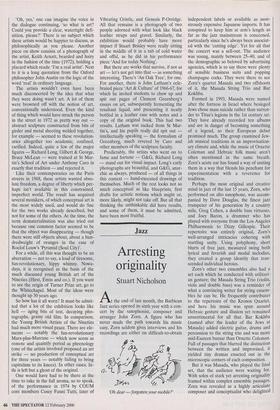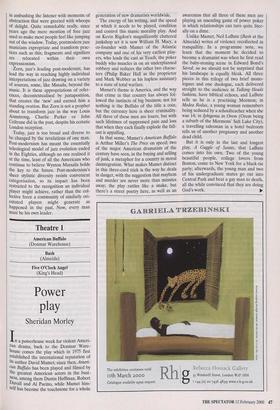Jazz
Arresting originality
Stuart Nicholson
At the end of last month, the Barbican Jazz series opened its sixth year with a con- cert by the saxophonist, composer and arranger John Zorn, A figure who has never made the path towards his music easy, Zom seldom gives interviews and his recordings are either on difficult-to-obtain `Oh dear — forgotten your mobile?' independent labels or available as mon- strously expensive Japanese imports. It has conspired to keep him at arm's length as far as the jazz mainstream is concerned, particularly since he's always been associat- ed with the 'cutting edge'. Yet for all that the concert was a sell-out. The audience was young, mainly between 25-40, and of the demographic so beloved by advertising agencies, which is to say there were plenty of sensible business suits and popping champagne corks. They were there to see Zom's quartet Masada and two offshoots of it, the Masada String Trio and Bar Kokhba.
Formed in 1993, Masada were named after the fortress in Israel where besieged Jews chose mass suicide rather than surren- der to Titus's legions in the 1st century AD. They have already recorded ten albums and are in danger of becoming something of a legend, so their European debut promised much. The group examined Jew- ish musical traditions in an improvisation- ary climate and, while the music of Ornette Coleman and Hebraic folk music aren't often mentioned in the same breath, Zorn's acute ear has found a way of uniting them in a way that blends his penchant for experimentation with a reverence for tradition.
Perhaps the most original and creative mind in jazz of the last 15 years, Zorn, who performed on alto saxophone, was accom- panied by Dave Douglas, the finest jazz trumpeter of his generation by a country mile, Greg Cohen, a double bass virtuoso, and Joey Baron, a drummer who has played with everyone from the Los Angeles Philharmonic to Dizzy Gillespie. Their repertoire was entirely original, Zom's well-arranged intricacies cohering with startling unity. Using polyphony, short blurts of free jazz, measured swing both lyrical and feverish and modal melodies, they created a group identity that tran- scended individual heroics.
Zorn's other two ensembles also had a set each which he conducted with utilitari- an gesture; the Masada String Trio (violin, viola and double bass) was a reminder of what a convincing writer for string ensem- bles he can be. He frequently contributes to the repertoire of the Kronos Quartet, and here his music was spun around Hebraic gesture and illusion yet remained unsentimental for all that. Bar Kokhba (named after the leader of the Jews at Masada) added electric guitar, drums and percussion to the string trio and was more mid-Eastern bazaar than Ornette Coleman. Full of passages that blurred the distinction between the written and improvised, it yielded tiny dramas enacted out in the microscopic corners of each composition. But it was Masada, who played the final set, that the audience were waiting for. With solos of stark yet arresting originality framed within complex ensemble passages, Zorn was revealed as a highly articulate composer and conceptualist who delighted in ambushing the listener with moments of abstraction that were greeted with whoops of delight. Quite remarkable really, since years ago the mere mention of free jazz used to make most people feel like jumping out of the window. Today, postmodern jazz musicians expropriate and transform prac- tices such as this; fragments and signifiers are relocated within their own expressionism.
Zorn, jazz's leading post-modernist, has lead the way in reaching highly individual interpretations of jazz drawing on a variety of sources, some, like Masada, beyond the music. It is these appropriations of refer- ences, decontextualised by juxtaposition, that creates the 'new' and earned him a standing ovation. But Zorn is not a prophet about to transform jazz in the way Louis Armstrong, Charlie Parker or John Coltrane did in the past, despite his ecstatic London reception.
Today, jazz is too broad and diverse to be changed by the revelations of one man. Post-modernism has meant the essentially teleological model of jazz evolution ended in the Eighties, although no one realised it at the time, least of all the Americans who continue to believe Wynton Marsalis holds the key to the future. Post-modernism's sheer stylistic diversity resists convenient categorisation, so its impact has been restricted to the recognition an individual Player might achieve, rather than the col- lective force a community of similarly ori- entated players might generate as happened in the past. Now, every man must be his own leader.



































































 Previous page
Previous page